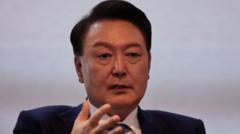The push for impeachment faced a setback last Saturday when a vote fell short, leading to intense criticism of the PPP's plan by opposition party members. Democratic Party representatives condemned the PPP's arrangement as an "illegal, unconstitutional second insurrection." With a vocal public expressing concern over leadership ambiguity, the Ministry of National Defence confirmed Yoon's persistent command over armed forces, allowing him the theoretical ability to intervene in foreign policy matters, particularly relating to threats from North Korea.
While addressing the public after the martial law announcement, Yoon asserted that he would not initiate further martial law and apologized for the disruption caused. Nevertheless, opposition leaders have vowed to continue pursuing impeachment motions every Saturday until they succeed. Democratic Party chief Lee Jae-myung has called for Yoon's resignation, warning that the president’s actions could irreparably harm the country and the economy.
As political tensions escalate, South Koreans remain focused on the implications of the ongoing leadership contestation and the future of governance in their nation. The situation is rapidly evolving, raising questions about democratic processes and public trust in leadership amid increasing unrest.
While addressing the public after the martial law announcement, Yoon asserted that he would not initiate further martial law and apologized for the disruption caused. Nevertheless, opposition leaders have vowed to continue pursuing impeachment motions every Saturday until they succeed. Democratic Party chief Lee Jae-myung has called for Yoon's resignation, warning that the president’s actions could irreparably harm the country and the economy.
As political tensions escalate, South Koreans remain focused on the implications of the ongoing leadership contestation and the future of governance in their nation. The situation is rapidly evolving, raising questions about democratic processes and public trust in leadership amid increasing unrest.


















